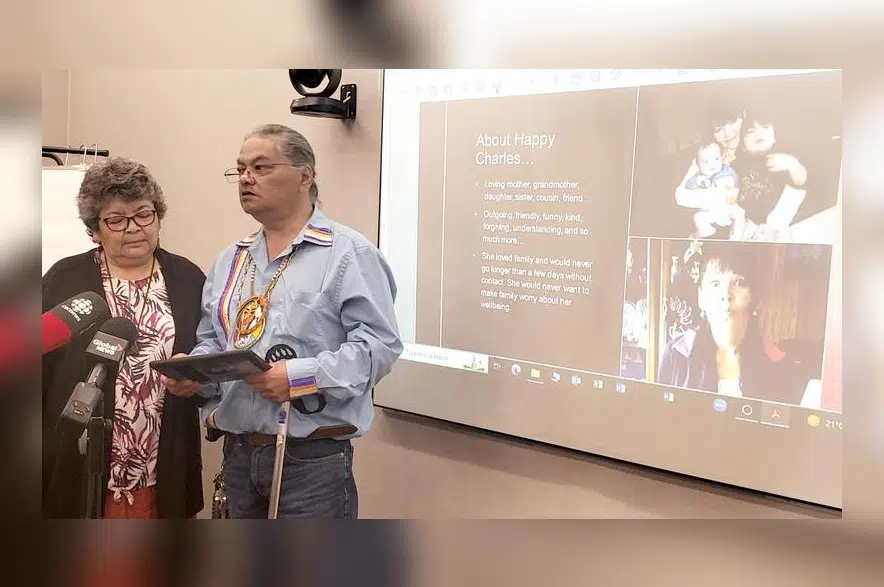By Susan McNeil
The family of Happy Charles, who has been missing since 2017, would like an independent missing persons office based in Prince Albert.
Her parents, Regina and Carson Poitras, and two daughters spoke to media on Tuesday, saying that an independent office could provide support for families and improve communication at the same time.
“The families just want to be heard. To know that somebody cares, somebody’s listening, somebody will take forward their message to the authorities,” Carson said.
When Charles went missing, the missing persons investigator job in Prince Albert was open, which made the experience very difficult for her family and delayed the start of the investigation.
“A lot of families are not heard, even when they’re talking directly to the police,” Carson stated.
He said the office should be available for all families, and not limited to those connected to missing Indigenous women and girls. Carson said he was surprised to learn that a lot of the supports available to Indigenous families are not there for other people.
“They’re going through the same thing we’re going through, if not worse, because they have absolutely no support at all,” he said. “They’ve sold their house, they sold their car, they have sold almost everything to go on searches.”
Connecting with other families and sharing experiences has been helpful for the Poitras family. It was an idea supported by Sgt. Kathy Edwardsen, who is in charge of investigating historical cases – including missing persons and homicides – for the Prince Albert Police Service.
It would be easy to get an overwhelming amount of information, as people go missing every day, some run away and some are just unhappy in their situation, Edwardsen said. The more precise the information, the better the police response is, Edwardsen explained. For instance, a report of a body north of the city is fairly general and hard to follow up on.
“Narrow it down. We can’t just search north of the city, we need to narrow it down so, OK, what did you hear north of the city?” she said.
In non-criminal disappearances, the connections could result in finding people more quickly, just through information sharing.
Edwardsen agreed with the Poitras family that some witnesses would be more willing to talk to someone who is not in law enforcement.
“There’s been lots of tips but they’re very vague and we can’t just search all of Saskatchewan,” she said.
For the Poitras family, they said they continue searching because they must, something all of the families of missing people share.
“We can’t quit. We can’t quit until we find them,” said Carson. “I’ll speak on behalf of all families. They are not going to quit until they find their loved ones.”
Meanwhile, Charles’ children are doing their best to keep their mother’s memory alive.
“I tell my son about my mom. He always wants to meet her,” said Marcia Bird, one of Charles’ daughters.
Aleisha Charles, a second daughter, said her mom was living with her for several months before she went missing.
She came to Prince Albert on April 1, 2017, and Aleisha’s house was one of her last stops.
“The last thing she said to me was, ‘Things are going to better, my girl.’ I don’t know what she meant by that at the time. What she thought was going to happen was that she was going to get into treatment,” Aleisha remembered.
Charles met two of her grandchildren before she disappeared. She now has seven.
The last known images of her came from the security cameras at PACI school, where Charles can be seen walking out of range. What happened after that remains a mystery.











